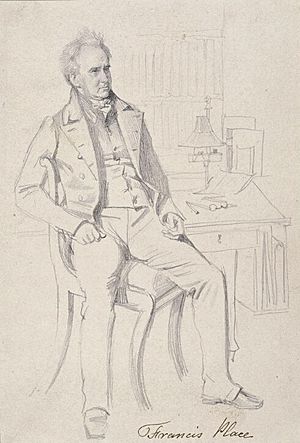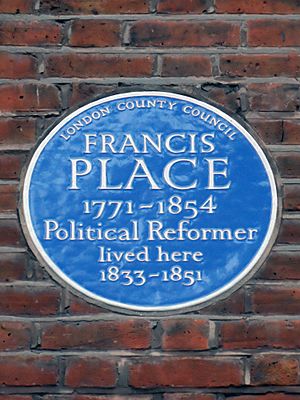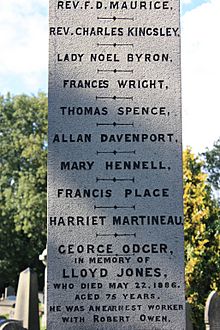Francis Place facts for kids
Quick facts for kids
Francis Place
|
|
|---|---|
| Born | 3 November 1771 |
| Died | 1 January 1854 London, England
|
Francis Place (born November 3, 1771, in London – died January 1, 1854, in London) was an important English social reformer. He was known for being a key figure in London's reform movements.
Contents
Early Life and Family
Francis Place was born in London on November 3, 1771. His father, Simon Place, was a baker who later became an officer for a court. The family lived in different parts of London, including Vinegar Yard and Ship and Anchor Court. In 1780, his father became a publican and moved the family to the Kings Arms pub.
Becoming a Tailor
Francis Place went to school in London until 1785. He learned basic reading, writing, and arithmetic. On June 20, 1785, he began an apprenticeship to learn how to make leather breeches. By the age of 18, he was a skilled worker.
In 1799, Place became a partner in a tailor's shop. A year later, he opened his own successful tailoring business at 16 Charing Cross. He retired from tailoring in 1817, but his children continued to run the shop, providing him with an income.
A Life of Activism
Francis Place was a dedicated activist who worked for social change for over 40 years. He was often asked for advice by other reformers.
Early Activism and the LCS
In 1793, Place became involved in a strike by leather-breeches makers. This led to him being refused work for several years, but he used this time to read and learn.
In 1794, Place joined the London Corresponding Society (LCS), a group that wanted political reform. He quickly became an important organizer for the society. He worked with other members, including a shoemaker named John Ashley and a gunmaker named Richard Fenton.
Place left the LCS in 1797. He believed that discussing and publishing reform ideas was more effective than political protests. However, he continued to support fellow reformers who faced difficulties.
Meeting Other Reformers
Place created a library of reform books at his shop at 16 Charing Cross. This library became a meeting place for many important thinkers. He met James Mill, and through him, he met Jeremy Bentham in 1812. He also connected with other influential people like Robert Owen and John Stuart Mill.
Working for Education
Place was interested in education. He helped raise money for the London Mechanics' Institution in 1823. This institution aimed to provide education for working-class people.
Ideas on Population
In the early 1820s, Place became interested in the ideas of Thomas Malthus. Malthus believed that the population might grow faster than the food supply. Place wrote a book about these ideas in 1822. He also helped start a campaign to share information about population control.
Changing Labour Laws
One of Francis Place's biggest achievements was working with Joseph Hume to successfully get the Combination Act repealed in 1824. This law had made it illegal for workers to form trade unions or go on strike. By repealing it, workers gained more freedom to organize and demand better conditions. Although there were many strikes afterward, the law was partly changed back in 1825.
Later Life and Legacy

In 1830, Place supported Rowland Detrosier, a working-class activist. Place helped Detrosier meet important figures like Bentham and J.S. Mill. Detrosier's work later influenced the Chartists.
Place was also active in the movement that led to the Reform Act 1832. This act brought important changes to the voting system in Britain.
In 1838, Place and William Lovett helped write the document that became the People's Charter. This charter outlined key demands for political reform, such as the right for all men to vote. When the Chartist movement became more focused on violent methods, Place stepped back. He then worked to repeal the Corn Laws, which were taxes on imported grain.
In his later years, Francis Place wrote his autobiography. He also organized his vast collection of notes, pamphlets, newspapers, and letters. This collection is now a very important historical resource. He suffered a stroke in 1844, which affected his health.
Francis Place passed away on January 1, 1854, in London. He was buried at Brompton Cemetery.
His Beliefs
Francis Place was influenced by the ideas of William Godwin and later Jeremy Bentham. He believed in using reason to improve society and supported the idea of extending voting rights.
He thought that trade unions might not be necessary if workers were allowed to try them. He believed that once workers saw how they operated, they might move on from them.
Family Life
On March 7, 1791, Francis Place married Elizabeth Chad. They had 15 children together, and 8 of them lived to adulthood.
After his wife Elizabeth died in 1827, Place went through a difficult period. On February 13, 1830, he married Louisa Chatterley, an actress. They separated in 1851. He then lived with his daughter Annie and her family for two years. Later, he bought a house and lived there with his two unmarried daughters, Mary and Jane.
Legacy
Francis Place's writings and collected documents are very valuable for understanding the history of the 19th century. His collection is now held by the British Library and is known as the Francis Place Collection. A diary he kept from 1825 to 1836 was published in 2007.
Francis Place's name is listed on the Reformers' Memorial in Kensal Green Cemetery in London, honoring his contributions to social reform.
 | Audre Lorde |
 | John Berry Meachum |
 | Ferdinand Lee Barnett |



